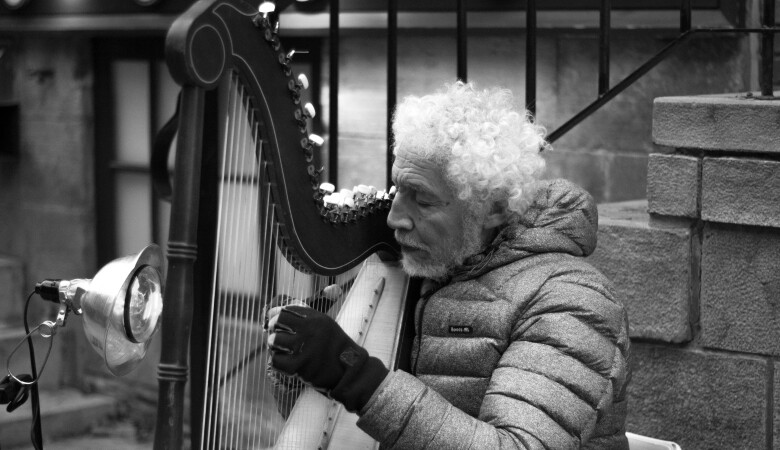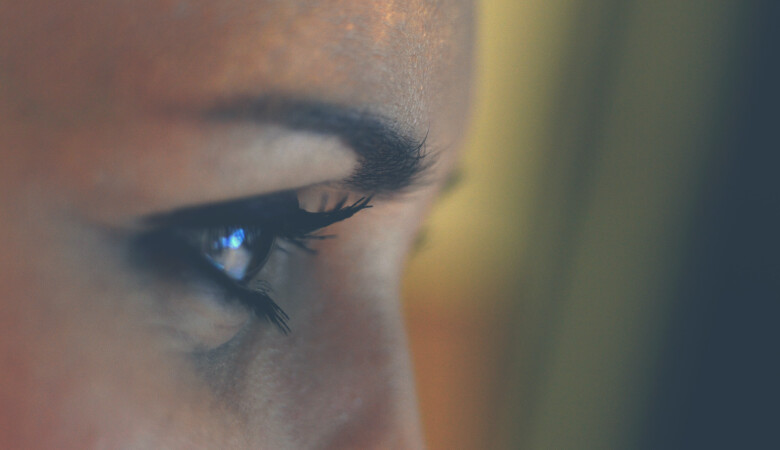Two Astounding Miracles, Two Opposite Reactions (Matthew Sermon 33 of 151)
September 08, 2002 | Andy Davis
Matthew 9:27-34
Miracles
Introduction
We are looking this morning at Matthew Chapter 9: 27-34, two astounding miracles and two opposite reactions to those miracles. In the beginning of the universe, right at the very beginning, God created light. When God said, "Let there be light," in effect, He was saying, "I want to communicate. I want to reveal. I want to show Myself. I want to display Myself and put My glory on display." So God said, "Let there be light, and there was light." Then God went about the business of creating things worth seeing. That's one way to look at Genesis Chapter 1. He created the world in all of its majestic glory and splendor. He separated clouds from water below. He separated water from dry land. All kinds of living things, verdant green, and all kinds of colors came on this earth, and then every species of living thing, all of them worth looking at. Then He created people who had eyes, vision, eyesight, the ability to receive, to take in what God has made.
David said in Psalm 139, "I praise you, Lord, because I am fearfully and wonderfully made. Your works are wonderful, I know that full well." I think that that applies to every aspect of our bodies, but I think there's something spectacular about the eyes, about vision in particular. At this moment, as you're looking at me, or wherever you're looking, whatever you're looking at, your eyes are making literally billions of calculations and adjustments every second. An astounding amount of information is flowing into your mind through your eyes, and you're processing it. I think about some of the most beautiful things that I have ever seen. I think about, for example, Acadia National Park, up in Maine, Mount Desert Island, an island right on the coast of the Atlantic Ocean. There is one cliff, in particular, that as you're sitting there, you can see, Echo Lake, a freshwater lake, cold in October. I can see the Atlantic Ocean and the rocky coastline as it goes up and down. I can see the trees, and I can see eagles riding the thermals in kind of a spiral pattern, up the 600 or 700 feet up that cliff and then up over my head. As I had watched them fly occasionally in a lazy way they would flap their wings and just gain control for a moment, and they would go over us. There would be large ones and small ones, and we would watch them for hours. Now, as I was looking at that, my brain was processing things more complex than I can even understand. There was the form or shape of the birds. There was the motion. There was the color. There was depth perspective. Science tells us that all of those different aspects of vision are handled at different parts of the brain, and yet we only see one image, that eagle that's flying over our heads at that particular moment. What an incredible thing is eyesight.
We are dependent on our eyes for so much, aren't we? So much of our understanding of the world flows in through our sight. Our sight mediates and validates other senses. When you hear or touch or smell something in your world, don't you immediately turn to look at it? Isn't that one of the first things you do? You want to see what it is that you're hearing. In Revelation Chapter 1, John heard a voice behind him of the Lord, the risen Lord. What does he do? He turns to look, and he has a vision of Christ. He hears first, the sound comes first, and then he looks. By the way, that was the order in Genesis, wasn't it? God spoke, "Let there be light, and there was light.” The sound comes first, but then the sight validates what are senses are telling us.
Try this some time. Look at something, an object, maybe on a table, look at it for a second or two. Then close your eyes, turn away. And reach out with your hand, and almost invariably, you'll be able put your hand on it. Neuroscientists don't understand that. They don't understand how the vision can lock in a spatial relationship around us all the time. We do it naturally, don't we? I know it, because when I walk into my kid's room at night, when it's pitch black in there, and step on something that's been left on the floor, I realize that all I needed was one second of light, and sometimes I'll turn on the hall light for a second, look in the room and turn it off, and then I can navigate around whatever may have been left there and not put away. I won't bump into their bed or into their furniture. I have set the room in my mind with just one second of light.
We depend on our eyesight for so much, don't we? And for that reason, vision, the idea of vision, saturates our language. For example, we speak of insight, something a poet has into the world. Or perhaps you pray for insight when you read the Scriptures, you're asking for insight. Or a foresight. It is something that business analysts are supposed to have to write for the “Wall Street Journal”, or something that a prophet would have into the future, a vision of Isaiah the prophet. What about hindsight? It's said to be 20/20 for people who are regretful of something that's happened in the past. Or this expression, "Out of sight, out of mind." That's an excuse for forgetful people. Or, ”We shall see." What does that mean? "We will experience. We will find out. We will learn. We will discover."
The scripture is filled with the word "behold." In Greek, it's "idou," and in Hebrew, "hinneh." "Behold, something happened." It means, "Look at this, experience it, take it into you." We're dependent on our eyesight for many things. There's also another expression which I think the text will refute, and that is, "Seeing is believing." Is that true? No, because Jesus did incredible miracles in front of his enemies. Did they believe? No. They saw and yet did not believe. It’s a fascinating thing, seeing is not always believing, not for Jesus' enemies.
For this reason, because we are so dependent on our eyesight, a poll was done recently and showed that Americans fear blindness more than any other disability. Think of what your world would be like if you were totally blind. And yet, for all of that, only a few of you, or a certain number of you, have perfect vision. It's perhaps one of the marks of the fall, the effect of sin on our bodies. A quarter of you statistically will have myopia. That means that your lens focus is just a millimeter to the front of your retina, and so you need lenses to adjust it. I think that blind people, therefore, are perhaps among the most courageous people that there are. Think about it. What would it be like to have to move through the world without being able to see? We're going to meet in the text today two very courageous blind people, who would not be stopped, who are going to keep calling after and pursuing Jesus until they get what they want.
Modern medical knowledge has made incredible strides. Science, specifically eye science, has come a long way since the Renaissance, when Dr. Georg Bartisch, an eye doctor during the Renaissance, went around healing cataract patients by poking their eyes with a sharp object. It created a little hole and patients could kind of see through it amidst their pain. But no one, not even today, not even here at Duke or at Johns Hopkins, no one can do what Jesus did in the text. Jesus has power to heal blindness. And that power, I believe, was given to him alone in a very unique way.
We also have another miracle in our text today, that is the healing of a man who is mute. He was dumb, he could not speak because of a demon. I found it a very interesting symmetry. Through the eyes, we take in. Through the mouth, we speak out. And so Christ is healing the means by which we have to take in the world and then healing the means that one can speak out, hopefully praise to Christ for what He's done. As we've seen in Matthew's Gospel, in these nine chapters, Matthew is step-by-step unfolding the credentials of Jesus Christ to be King of the kingdom of heaven. Right from the very beginning of the Gospel, we have His genealogy, where he lays out the evidence or proof that Jesus is the descendant of David, the descendant of Abraham. He is the Messiah. The genealogy would prove it to any Jew who knew the significance of being the Son of David. We're going to see the term "Son of David" in the text today and from there, we have the evidence in the end of Matthew Chapter 1, and into Matthew 2, of Jesus's supernatural birth, the virgin birth, and what God did at that point. Evidence that He was not just the Son of David, but the Son of God. He was God in the flesh. We've seen, unfolded from there, the miracles and the teachings of Jesus in an incredible way, more evidence than we need to prove the deity of Christ, and that He is indeed the King of the kingdom of heaven.
Healing the Blind
In verses Mathew 9:27-31, we see two blind beggars who are healed by Christ. We begin by seeing their faith in pursuit of Christ. They're pursuing Christ by faith. Verse 27, "As Jesus went on from there, two blind men followed Him, calling out, 'Have mercy on us, Son of David.'" These were true beggars, they were totally destitute. In the world today, statistics from the World Health Organization tell us that 45 million people in the world are blind, legally blind. Most of them are in the third world areas, their blindness caused by many things — unsanitary conditions, infectious organisms, blowing sand, accidents, war, malnutrition, excessive heat, bright sunshine. Infants are born blind because of bacteria they'll pick up from their mothers as they pass through the birth canal, or through diseases they may get while in the womb. When I was in Pakistan as a missionary, I had the privilege of helping an English eye doctor as he performed surgery on a trichiasis patient, and the problem there was that the eyelids had grown inwards so that all of their eyelashes were rubbing on the surface of the eye every time they blinked. What is it like for you when one eyelash detaches and gets into your eye? Are you a multi-tasker at that point? Can you do many things, or are you going to stop until you get that lash out of your eye? Imagine all of your eyelashes rubbing on your eye with every blink. Eventually you will go blind, literally. The plight of the blind is extreme, isn't it? It's impossible to work. They're stripped of the beauty and the information that we get all the time through our eyes. They're stripped also of hope for the future, because they are literally incurable, in most cases. Nowadays, certain conditions can be cured, but there are so many forms of blindness that even today we will not be able to cure. These two beggars were friends. I guess you've heard the expression, "The blind leading the blind." It actually was something that was known. They would stay together in communities, they would beg together, and they would be together. They were companions in darkness.
Now, for all of that, there are some advantages to being blind. And you think, "What possible advantages could there be?" There are spiritual advantages to being physically blind. Blindness strips you of the illusions of self-reliance, doesn't it? You realize you cannot make it alone. You can't eat or survive alone, you must have help. It makes you a beggar. And it's a good thing to be a beggar before Christ, isn't it? It's when you are self-reliant that Christ will do nothing for you. It's when you think that you can do it or make it on your own that Christ has nothing for you. It is not the healthy who need a doctor, but the sick, and the people who recognize that they are sick will go to Christ for the healing. These beggars are going to pursue Jesus, they're going to follow Him, they're going to cry out after Him, "Lord, Son of David, have mercy on us." Another thing that blindness does is it makes you bold and impervious to public opinion. You don't care what people think. You need to eat today, so you're going to beg boldly because you need to in order to survive. We get the same thing with Bartimaeus in Mark 10: 46 and following, "As Jesus came to Jericho and His disciples were leaving the city, a blind man named Bartimaeus was sitting by the roadside begging. When he heard that Jesus of Nazareth was going by, he began to shout, 'Jesus, Son of David, have mercy on me.' Many rebuked him and told him to be quiet, but he shouted all the more, 'Son of David, have mercy on me.'" He didn't care what people thought, impervious to public opinion, and he's going to pursue Christ until he gets what he wants.
In Verse 27 there's an unrelenting persistence for mercy. As Jesus went on from there, it says, "Two blind men followed Him, calling out, 'Have mercy on us, Son of David.'" They followed after Christ, stumbling pathetically, blind leading the blind, following the sound of the crowd perhaps, or something, trying to find where Jesus might be. Despite the delay, they keep calling out after Christ. They're pursuing him. And what are they calling for? They're calling for mercy. What is mercy? It means getting something from God that you know you don't deserve. I think grace means not getting from God the things you do deserve, namely wrath and judgment, in addition to all the blessings of the Gospel. But mercy, I think, specifically in this sense, means getting something from God you know you don't deserve.
John MacArthur put it this way, these two men came to Jesus not only with a right understanding of His great worthiness, but with the right understanding of their own great un-worthiness. That is the attitude of the heart that the Lord honors and accepts. Christ was the most merciful human being who ever lived. He reached out to the sick and healed them. He reached out to the crippled and gave them legs to walk. He healed the eyes of the blind, the ears of the deaf, and the mouths of the dumb. He found prostitutes and tax collectors, and drew them into the circle of His love. And He redeemed them and set them on their feet. He took the lonely and made them feel loved. He took little children and gathered them into His arms and loved them. Never was there a person on the face of the earth who showed the mercy of Jesus Christ. They're crying for the right thing, they're crying for mercy.
One thing about mercy, by the way, and this is a very important theological point, you can't demand it. You can't say, "I deserve mercy." See, those two don't go together. You can beg for mercy, but you can't demand mercy. These blind beggars were crying out for mercy. They had an uncommon faith, because they called Jesus Son of David. Son of David is a messianic title. They recognized and they believed that Jesus was the Messiah promised in the Old Testament. Matthew began his Gospel this very way, in Matthew 1:1, "A record of the genealogy of Jesus Christ, the Son of David." Those are the opening words of the New Testament. Jesus was indeed the Son of David.
This was later very controversial to the Jewish leaders. When Jesus entered Jerusalem on the donkey, and people are crying out, "Hosanna to the Son of David," the Pharisees are vey angry. They wanted Jesus to make the children stop, and Jesus said, "Haven't you read in the Scripture? Out of the mouths of children and infants you have ordained praise. I am the son of David." But later Jesus himself also had to correct the understanding of "Son of David." He asked His enemies, "What about the Christ, whose son is he?" And they answered, "Son of David." He said, "How is it then that David," in Psalm 110, speaking by the Spirit, said, ‘The Lord has said to my Lord, 'Sit at my right hand until I make your enemies a footstool for your feet.’ If then David calls Him Lord, how can He be his son?” In a Jewish way of thinking, a father would never call his own son Lord. The son would honor the father and the mother, as Moses commanded. How could it be that Jesus, physically descended from David, will be worshipped by David and called Lord? Where do you think David is right now, and what is he doing? Is he not calling Him Lord and worshipping Him in heaven? He is worshipping his own son, because He was more than just a physical descendant of David, He was the Son of God incarnate in the world.
But back to the blind beggars. Leon Morris says, "One of the things we have to recognize about these beggars is that they would have seen nothing about Jesus." Any information they had about Christ came in through hearing. Where does faith come from? Faith comes from hearing the report. The blind beggars actually represent us. Have any of you ever seen Jesus? Have you ever seen him do a miracle, like we're talking about here? No. You're hearing about it this morning. Do you believe? Do you believe, the way that these blind men believed? They got all their information through hearing. Faith comes from hearing, and that's how they knew that He was the Son of David.
Jesus is going to test their faith. As He walks by and they cry out, "Have mercy on us, Son of David'? what does He say? Not a word. He keeps walking. They get up, they follow, they're crying out, they continually cry out, the Greek says, after Him. He didn't say a thing. He goes into the house. Is He cold? Is he callous? Is he unfeeling? Not at all. He wants to test their faith. Further more, when they come in to the house- it was probably Peter's house, where Jesus was staying in Capernaum,- he looks at them and says, "Do you believe that I am able to do this?" This is very interesting. Ordinarily, the Scripture does not speak of "believe that" when connected with Christ. It speaks of belief in Christ, and as a result of that, believing that He can do many things. He starts with the healing, "Do you believe that I am able to do this thing?" He asked them that question. It's an interesting question, too, because why do you think that they're there? He knows their hearts. He knows they believe. But what does He want? He wants them to testify to it. He wants them to speak their faith in Jesus Christ. "Yes, Lord," they answer. God, by the way, frequently tests our faith, doesn't He? Have you ever felt like this in prayer? You're crying out to Him, "Lord, Son of David, have mercy," and He just walks right by and doesn't even seem to answer? He is testing your faith to see if you'll be as persistent as these blind men who would not give up until they got what they wanted. So, they come into the house, and Jesus tests them further. "Do you believe I'm able to do this?" "Yes, Lord," they answer. Then, in verse 29, "He touched their eyes and said, 'According to your faith will it be done to you.'" He touched their eyes. Remember we talked about how Jesus was touchable. Jesus was in the world, incarnate, physical, that He might touch people physically. He did many of His healings by touch. He would lay hands on people and heal them. He didn't need to do it. all He had to do was speak and it would be done. But He loved to touch people, so He reaches out and touches their blind eyes, and says, "According to your faith will it be done to you." Instantly their sight is restored, and I think it must have been 20/20, absolute perfect vision. He touched their eyes and immediately their sight was restored.
This astounding miracle, I believe, is utterly unique to Jesus Christ. There is no record anywhere in the 39 books of the Old Testament of a healing of a blind man. It'd never been done. Moses did miracles, mighty incredible miracles to show the power of God. Elijah and Elisha even saw people raised from the dead. Those miracles were done, but this one, for some reason, God reserved to His own Son. Interestingly, after this point, there's no record of it either, except for the scales that fell from Saul's eyes. I think it's different perhaps there. It seems that the healing of blindness in particular was reserved to the Son of God. In Exodus Chapter 4: 11 we see that the giving of sight is a divine activity. “The Lord said to Moses, ‘Who gave man his mouth? Who makes him deaf or mute? Who gives him sight or makes him blind? Is it not I, the Lord?’” There's a lot of theology in that one verse. Theology of suffering, theology of muteness and blindness. "I can make a man blind and I can make him see again. I can do all of those things, I am the Lord." This recovery of sight was something unique to Christ. The messianic prophecies in Isaiah are clear. Isaiah 29:18, "In that day the deaf will hear the words of the scroll, and out of the gloom and darkness, the eyes of the blind will see." Isaiah 35: 5-6, "Then will the eyes of the blind be opened and the ears of the deaf unstopped. Then will the lame leap like a deer and the mute tongue shout for joy. Water will gush forth in the wilderness and streams in the desert." Isaiah 42:6-7, "I, the Lord, have called you in righteousness," this is God speaking to Christ, I believe. "I will take hold of your hand. I will keep you and make you to be a covenant for the people and a light for the Gentiles, to open eyes that are blind, to free captives from prison, and to release from the dungeon those who sit in darkness." When Jesus began His ministry in Nazareth, His hometown, He got up on the Sabbath and went to read the scroll of Isaiah the prophet. It was unrolled for Him, and He found the place where it is written, "The Spirit of the Lord is on me, because He has anointed me to preach good news to the poor. He has sent me to proclaim freedom for the captives," listen, “and recovery of sight to the blind, to release the oppressed, to proclaim the year of the Lord's favor." Then he rolled up the scroll, gave it back to the attendant, and sat down, and then He spoke these words, "Today in your hearing, this Scripture is fulfilled." This miracle, this power of recovery of sight to the blind was unique to Christ. It was His special Miracle. He alone had this kind of power.
Now notice Jesus says to the blind man, "According to your faith will it be done to you." I've thought about this all week long, and I think this is interesting. There is a direct correlation, in my opinion, between faith and eyesight. Both of them are essentially passive. Both of them essentially take in what God is presenting to you. Does the eye make something red or blue or green? Does the eye make something beautiful or majestic or lofty? No. But it sees it, and receives it and takes it in. Jesus said, "If your eyes are good, your whole body will be full of light." And so also faith does not make a reality from God, doesn't create something that God wasn't willing to do, but rather by faith we take in what God is doing. By faith, we receive. By faith, we are justified. By faith, we are forgiven. And by faith, these two men were healed. "According to your faith will it be done to you." Archbishop Trent put it this way, "The faith which in itself is nothing is yet the organ for receiving everything. It is the conducting link between man's emptiness and God's fullness. Faith is the bucket let down into the fountain of God's grace, without which the man could never draw water of life from the wells of salvation. Faith is the purse which cannot of itself make its owner rich, yet effectively it enriches by the wealth he contained."
And so they had faith for this healing, but sadly they did not have faith for obedience. Look how the account goes on in verse 30-31, "Jesus warned them sternly, 'See that no one knows about this.' But they went out and spread the news about Him all over that region." Their faith did not extend beyond the healing to submission and obedience. I think it's easier to believe for salvation than to obey constantly. It is harder for us to obey the commands of Jesus Christ day by day, moment by moment than it is to trust Him for salvation. It's an incredible thing. They disobeyed Him. There was nothing complicated about the command, "Don't tell anyone about this." You might say, "But, Jesus, why? Why? This incredible miracle, why not publish it abroad?” In many cases, He did want the healing of people to be published abroad. But He is a King, and Jesus did not want them to do this. We can speculate, it could be that He did not want too early an association with this title, Son of David. Could be He didn't want lots of blind people coming for healings, although Jesus did more blind healing than any other kind of healing. But it doesn't really matter, does it? Do we need to understand in order to obey? We really don't. We just need to understand the command, and then we obey. And they understood, and they disobeyed.
Healing the Mute
In verses 32 and 33, we see the other healing that He does. It's almost inserted here as though it were nothing. In verse 32-33, it says, "While they were going out, a man who was demon-possessed and could not talk was brought to Jesus. And when the demon was driven out, the man who had been mute, [dumb] spoke." We first see that he has demon eyes, that's the Greek word. It means controlled and really, in one sense, possessed, I guess, by a demon. Realize a demon can possess nothing, because they know their time is short, but the demon had controlled this man so much that the man lost the ability to speak. So we see him dumb, mute. Imagine the tragedy, unable to speak to a loved one, a wife, or unable to speak to a child or a parent, unable to pray out loud, unable to sing praise songs, unable to put out any words at all. Chrysostom said this about it, "The affliction was not natural, but the device of an evil spirit. For this cause, H doesn’t require faith of the mute but straight away heals the disease." So he doesn't ask him anything. He doesn't interrogate him. He just heals him. He drives out the demon. This man was destitute. He was a spiritual beggar, he was without hope and without God in the world, completely without resources, so he was a fit vessel for the mercy of God, and he is delivered. A simple command from Christ, and the demon is gone. The formerly silent mouth is now enabled to speak.
Here is where it gets interesting. What did he say? Well, the text doesn't tell us. Did he say "thank you?" Did he praise the Lord? Did he shout, "I can talk again everybody! Look, I can talk!”? Did he speak? The demon had controlled his tongue and silenced it. The power of the demon over the tongue was broken, but the power of the heart over the tongue is not broken and never will be. For out of the fullness of the heart, the mouth speaks. So, if the man had a regenerate heart, he would speak regenerate thoughts. If he did not, he would not. Who knows, but that later that week, he was heard gossiping or slandering or arguing or telling an off-color joke. Or perhaps he was heard speaking words of praise and glory to God. We really have no idea. Oh, I hope he used his speaking ability to speak words of praise to God. James put it this way, "We all stumble in many ways. If anyone is never at fault in what he says, he is a perfect man, able to keep his whole body in check. All kinds of animals, birds, reptiles, and creatures of the sea are being tamed and have been tamed by a man, but no man can tame the tongue. It is a restless evil full of deadly poison." That's what James says about the tongue. I have no idea what this man did. But I do know this, Jesus warned us that how we use this thing, this mouth, will be ample evidence or give ample evidence for our eternal destiny, whether heaven or hell. He put it this way after his enemies did in Matthew 12 the very thing they're about to do in our text, namely ascribed Jesus' healing powers to the devil, they ascribed His supernatural healing power to the devil. Jesus said to them this in Matthew 12: 34-37, "You brood of vipers, how can you who are evil say anything good? For out of the overflow of the heart, the mouth speaks. The good man brings good things out of the good stored up in him. The evil man brings evil things out of the evil stored up in him. But I tell you that men will have to give an account on the day of judgment for every careless word they have spoken. For by your words you will be acquitted, and by your words you will be condemned." We have no idea what this man went out and said. But I do know that his speaking record from that point on was kept in heaven, and all Jesus need to do is look at what he said over those years and he'd know whether he was saved or not. How do you use your tongue? You don't have a demon controlling your tongue. You have a heart which controls your tongue. What does your tongue show about your heart? That's a question, isn't it?
Differing Reactions to Healing
At that point, we have an assessment of Christ. Amazed and open versus angry and opposing.In verses 33-34, “The crowd was amazed and said, 'Nothing like this has ever been seen in Israel.' But the Pharisees said, 'It is by the prince of demons that he drives out demons.'" Christ is on the dock right now worldwide. He is standing there waiting to be assessed, waiting to be judged. It's a very interesting thing, isn't it? Just like Pilate on the judge's seat and Jesus standing before him, we all make an assessment about Christ. Doesn't change who He is, He is God, doesn't change the reality about Him, but we are assessing, we're weighing. The audience, the people watching Jesus at that moment, weighed who He is. The evidence was the same, but the reaction was very different. On the one hand, some people were amazed and open. They said, "Nothing like this has ever been seen in Israel." They searched back and thought about Moses and Elijah and Elisha and Daniel, and all of those, and none of them had done this. This is a first. They'd never heard it before, and they're ready to believe in Christ. But there were others that were angry and opposing. Perhaps they were jealous of Jesus. Perhaps they were offended by His independence. Perhaps they were angry at His rebukes, and felt prideful. Perhaps they were guilty by His holy example. But they were set against Him forever.
Everywhere Jesus ministers, we have a division, every time, into believers and unbelievers. Jesus put it this way, "Do you think that I came to bring peace on the earth? No, I tell you, but division. From now on, there will be five in one family divided against each other, three against two, and two against three. They will be divided. Father against son, and son against father, mother against daughter and daughter against mother, mother-in-law against daughter-in-law and daughter-in-law against mother-in-law.” In John's Gospel, again and again, it says, "But they were divided.” “But the Jews were divided." Again and again it happens. And so in John Chapter 10:19, at this point, it says ,”The Jews were again divided. Many of them said, 'He is demon-possessed and raving mad.'" They ascribed to Jesus the power of the devil, the very same thing we see in this text. But others said, "These are not the sayings of a man possessed by a demon. Can a man possessed by a demon open the eyes of the blind?"
There's a division, and there's going to be a division, isn't there, on Judgment Day? There'll be wheat and chaff. There'll be good fish and bad fish. There'll be division between sheep and goats. Again and again, the images of division come, and the issue is always the same. Just as it was when the bronze serpent was lifted up and all of Israel is divided into two categories, believer and unbeliever, so it will be at the end of the world.
Application
What application can we take from this incredible miracle story? First of all, the astounding power of Jesus Christ. He creates and He heals, He has power. September 11th in our country showed that shock therapy does not jar anyone out of spiritual blindness. It doesn't matter how many of our buildings will be erased by terrorists. Spiritual blindness will never be healed that way. There is only one Savior from that kind of blindness, and it's the same one that saves from physical blindness, Jesus. When you look at Jesus, what do you see? Do you see an ordinary man? Do you see a myth? Do you see a God among gods? Do you see a great spiritual leader? 2 Corinthians 4:4 says,”The god of this age, [Satan] has blinded the eyes of the world so they cannot see in Christ what He really is.”True conversion occurs, when God, who said, “Let light shine out of darkness,” makes His light shine in your hearts to give you a light of the knowledge of the glory of God in the face of Christ.
When you look at Jesus, what do you see? Do you see a Savior? Do you see Him on the cross, dying for you, shedding His blood that you might have eternal life? Do you see that? Do you see Him risen from the dead, showing hands and feet to Doubting Thomas? Do you see that? Or do you see something else? And then secondly, what do you say? Can you speak a word of confession that Jesus is your Savior? Romans Chapter 10 says, “The word is near you. It is in your mouth and in your heart, that is the word of faith that we are proclaiming, that if you confess with your mouth Jesus is Lord, and believe in your heart that God raised Him from the dead, you will be saved. For it is with the heart that you believe and are justified, and it is with the mouth that you confess and are saved."






























